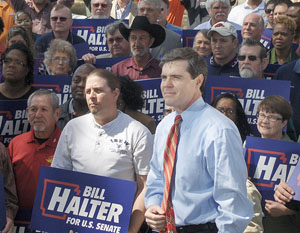Deep-pocketed donors are just beginning to take advantage of the post-Citizens United world of campaign finance by pouring money into elections as they never have before. As both corporations and unions ramp up political spending, the Washington Post takes a close look at just how easy it is for big spenders to cover their tracks. TW Farnam explains that the Supreme Court ruling has “largely tied the hands of the Federal Election Commission,” preventing it from forcing political advertisers to reveal their donors. Instead, it’s now fallen on the Internal Revenue Service to take up far more of a watchdog role, determining which groups are legally obliged to disclose their donors and which aren’t.
It works like this: non-profit groups that predominantly focus on issue advocacy, rather than politics and elections, aren’t required to disclose their donors, and it’s up to the IRS to figure out whether such a group conforms to its stated mission. But it’s becoming increasingly unclear which groups do and don’t fit into this category, particularly now as Citizens United has lifted rules that had once restricted the kind of money that groups could pour into elections. There are tons of loopholes that can be exploited, particularly as the IRS doesn’t seem to have the resources and know-how to meets its new responsibilities as a campaign finance watchdog. Farnam lays it out:
“The chances of the IRS being able to catch a violation of the tax law around campaigns is virtually nil,” said Marcus S. Owens, a lawyer with Caplin & Drysdale who directed the agency’s tax-exempt organizations division for 10 years. “Certainly if it happens, it’s going to be well after the election has already ended.”…
The IRS, which declined to comment, requires groups whose “primary purpose” is political activity to name their donors. But that requirement is open to wide interpretation…
Since the court’s ruling, some groups have opted to disclose donor information to the FEC. But others, including some of the largest, have protected donors’ identities by registering with the IRS as nonprofits whose primary purpose is advocacy rather than politics.
Even if the IRS finds that political groups are in violation of tax rules, it doesn’t have the authority to fine them. The DISCLOSE Act would have put much stricter rules and oversight into place, but Republicans killed that legislation this summer. Within the current weak regulatory framework, there’s even more running room for corporations and other donors to hide their spending by giving to third-party non-profit groups that won’t be challenged to reveal their donors. And given the risks involved in openly backing campaigns and candidates with controversial views, that’s an option that may only become more appealing.










